Given the sheer volume of marketing emails that are sent and received each day, it’s a no-brainer that personalization is key when it comes to ensuring relevance for your target audience and driving higher click and conversion rates. That being said, achieving personalization at scale is a challenge, and building the basis for dynamic email content can be time-consuming and costly. That’s where AI email tools come into play. AI can’t do everything — but it can help you achieve hyper-personalization at scale and serve as a useful tool for driving higher output and impact with email marketing.
How Is AI Used for Email Personalization?
There are two main approaches to using AI for email marketing. The first is straightforward: using AI to write the emails themselves as a way to reduce time and effort in copywriting. The second, which is the focus of this guide, is a more complex method of analyzing and leveraging large amounts of user data to drive email personalization at scale.
Here are a few ways in which AI can be used for email personalization:
1. User Segmentation and Profiling
AI algorithms analyze large datasets to identify patterns and segment users based on various attributes such as demographics, past behavior, purchase history, and preferences. This segmentation enables marketers to target specific groups with personalized content that resonates with their interests.
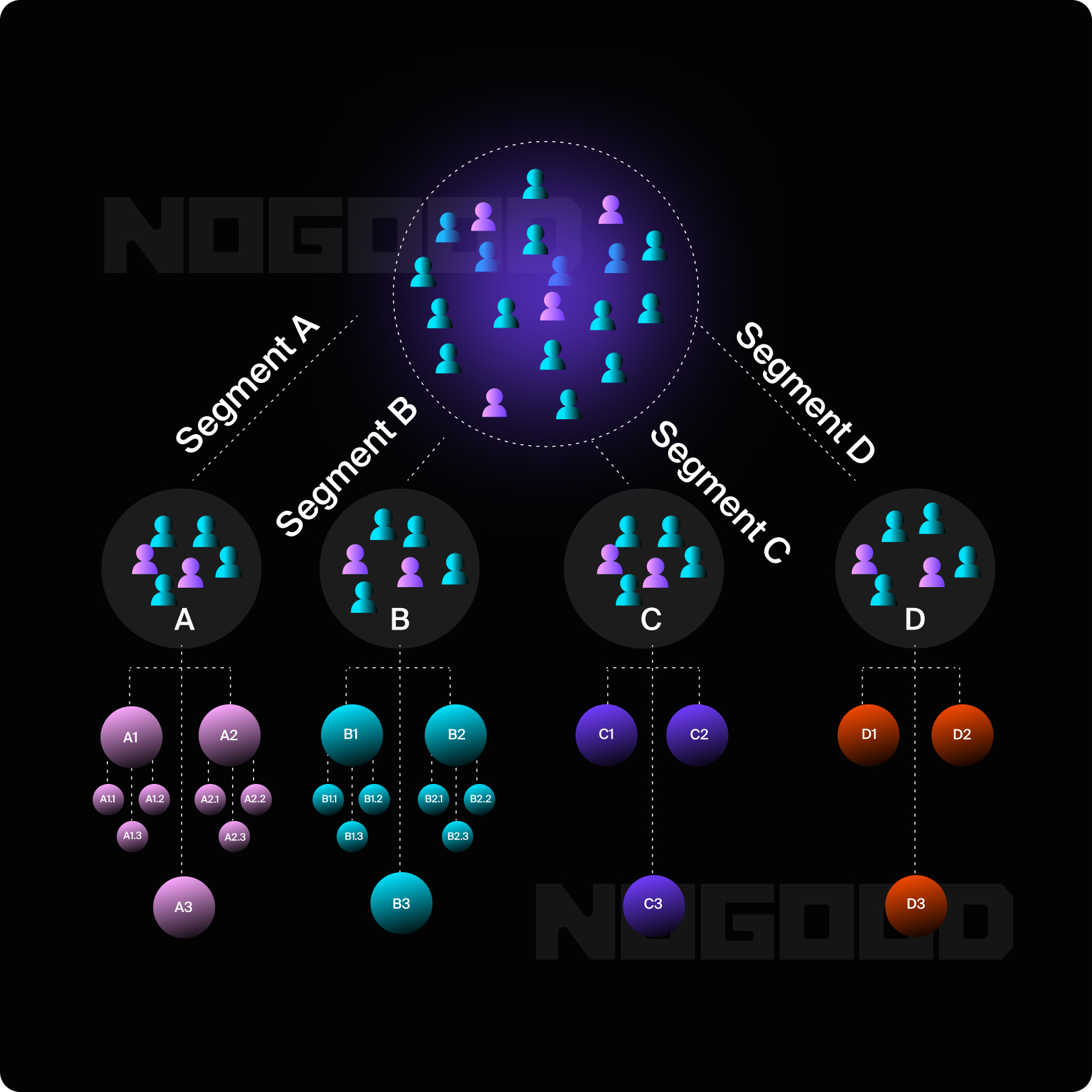
2. Predictive Analytics
AI uses predictive analytics to forecast future user behavior based on historical data. This allows marketers to anticipate needs and send proactive emails that guide users along the customer journey, such as suggesting replenishment products before they run out.
3. Optimized Send Times
AI can determine the optimal time to send emails to each recipient based on their past interactions. By analyzing when users are most likely to open and engage with emails, AI ensures that messages are sent at the most effective times, improving open and click-through rates.
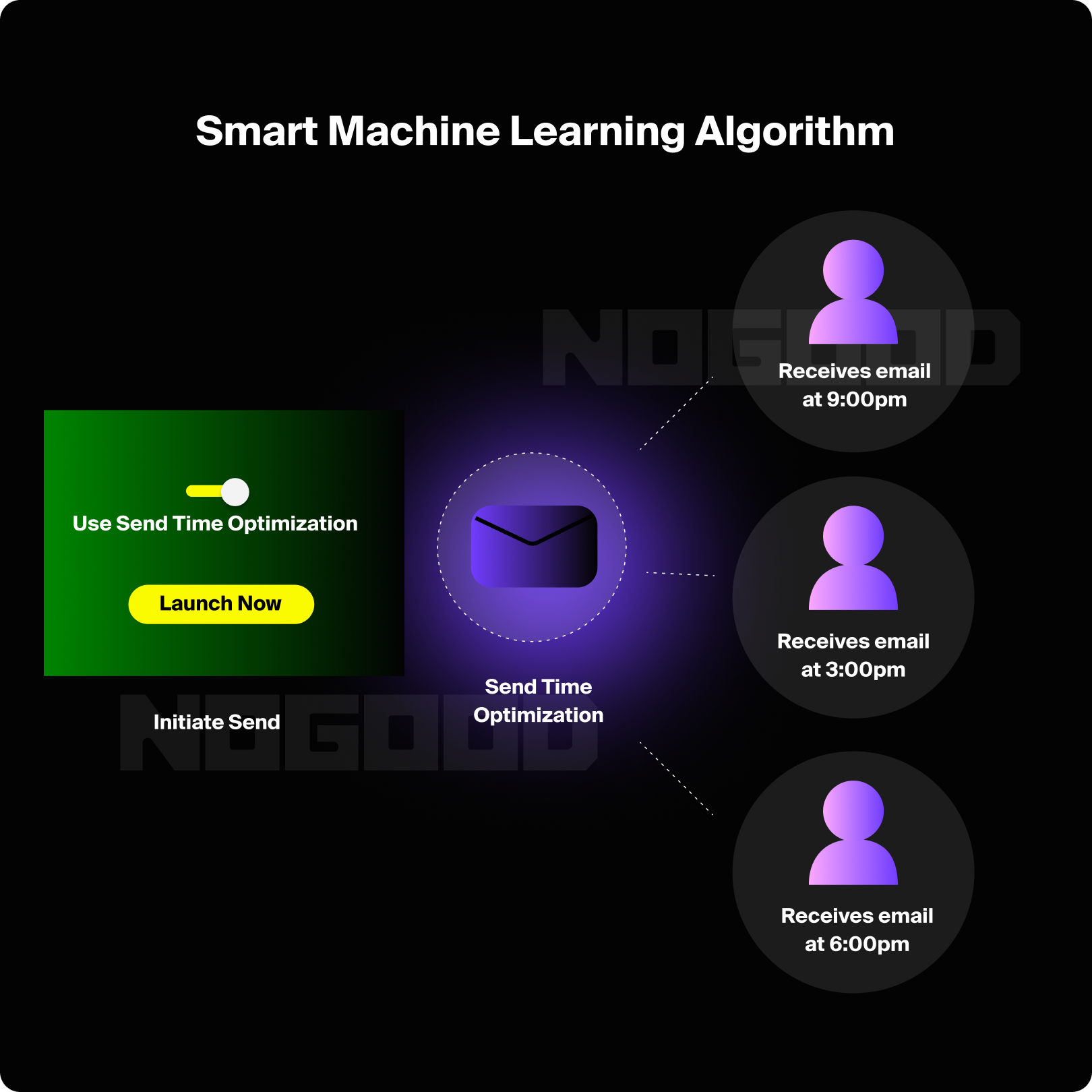
4. Subject Line and Content Optimization
AI can test and optimize subject lines, email copy, and call-to-action buttons. Through techniques like A/B testing and natural language processing, AI can determine which variations perform best and adapt future emails accordingly.
Can AI Write My Emails?
Yes, but that’s not the end of the story — writing an email is only one part of the email marketing process. Even the most well-written email will fall flat if it’s not strategically optimized for the end user. AI copywriting tools can automate, speed up, and streamline their content writing process, but there’s still a need for skilled copywriters to spend time on revision, refinement, and strategy — all of which are crucial in ensuring both high quality and quantity of content.
Instead of just asking if AI can write your emails, ask yourself if AI can help you determine what to write for each email and each user or audience segment. AI can be used to analyze user data, including browsing history, purchase behavior, and engagement metrics, to generate insights about what content will resonate most with each segment of your audience. This data-driven approach ensures that the content you create is highly relevant and personalized, increasing the chances of engagement and conversion.
AI can also analyze the results of previous A/B tests to determine what types of subject lines, content, and calls-to-action have performed best with different segments of your audience. These insights can then be used to guide future email content, ensuring that you continually optimize your messaging based on real-world performance data.
So the answer is yes: AI can write your emails, but it shouldn’t stop there.
What Is the Best AI Tool for Email Marketing?
There are hundreds of AI tools that can be used for email personalization, but the most useful ones are likely to be features that are integrated into existing email marketing platforms like Klaviyo, Braze, Mailchimp, Iterable, etc. Here’s an overview of the best AI tools that you should be using to enhance the impact of your marketing emails.
1. Klaviyo Predictive Analytics
Klaviyo predictive analytics leverages advanced data science to forecast customer behavior and trends, enabling businesses to optimize their email marketing strategies. By analyzing historical data, Klaviyo can predict key metrics such as customer lifetime value, churn probability, and future purchasing behavior. This predictive power allows marketers to tailor their email campaigns with a high degree of personalization. For instance, they can send targeted promotions to likely repeat buyers or re-engage customers at risk of churning. The benefit of this approach is twofold: it enhances the customer experience by delivering relevant content and boosts business outcomes through more effective and efficient marketing efforts.
To access Klaviyo’s predictive analytics, users must meet the following conditions:
- Minimum Order Volume: At least 500 customers must have placed an order. This count refers specifically to unique customers who have made purchases, not just total profiles.
- Ecommerce Integration: Users need to have an integration with an ecommerce platform such as Shopify, BigCommerce, or Magento or utilize Klaviyo’s API to track placed orders.
- Order History: There must be at least 180 days of order history, with some orders placed within the last 30 days.
- Repeat Customers: A subset of customers must have placed three or more orders
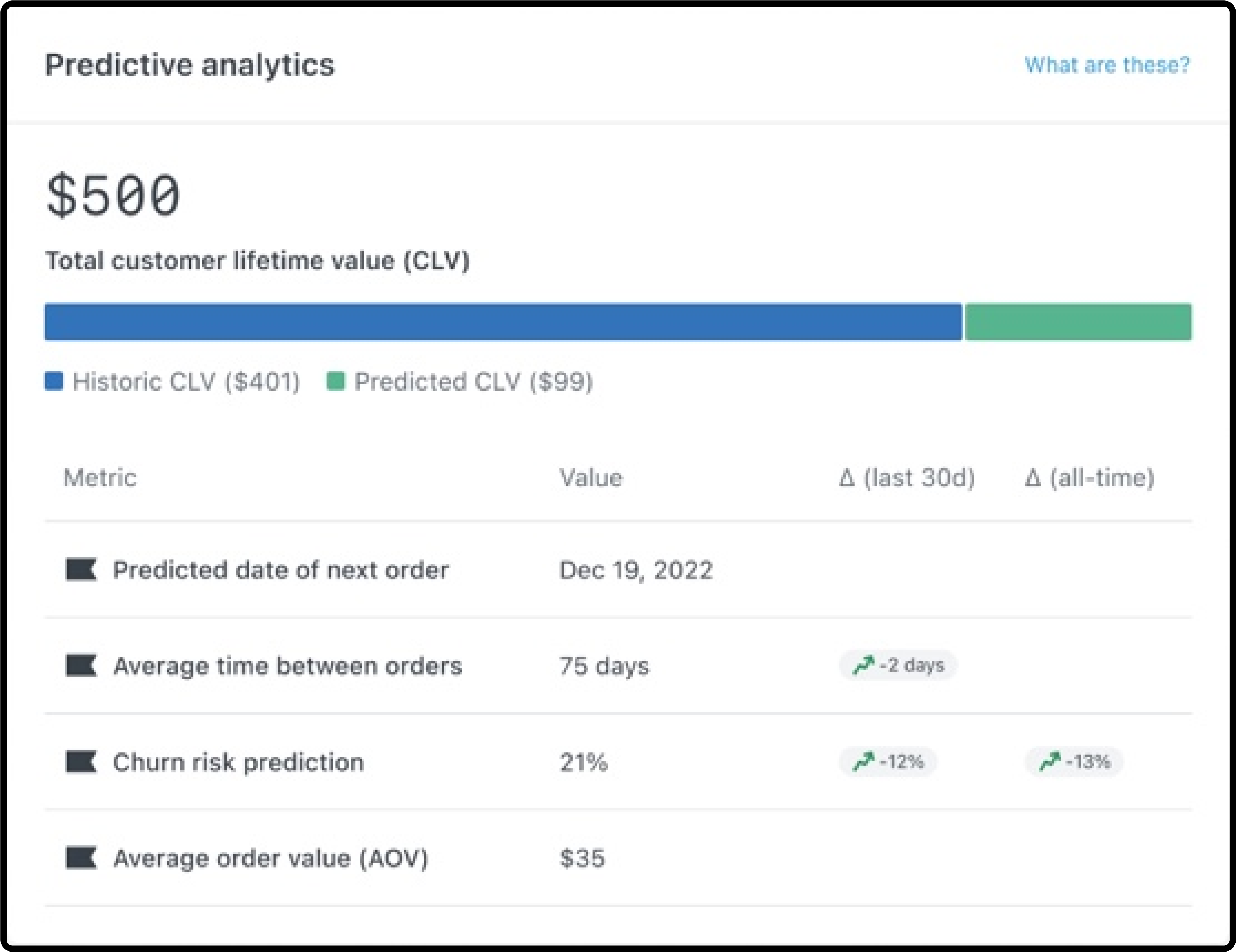
2. Iterable Brand Affinity
Brand Affinity™ is a feature of Iterable AI that labels users based on their historical engagement with your brand. These labels—loyal, positive, neutral, negative, and unscored—are generated weekly and are based on user interactions across all communication channels, including emails, push notifications, and in-app messages.
Brand Affinity scores are calculated using the user’s history of interactions with your messages. Recent interactions are weighted more heavily. Each user is assigned one of the following labels: loyal, highly engaged with your messages; positive, generally engaged but less frequently than loyal users; neutral, occasionally engaged; negative, usually disengaged; and unscored, not enough data to generate a label.
You can use these labels in segmentation, campaigns, journeys, data feeds, and Catalog collections to send personalized, relevant messages to your customers. For example, you might use Brand Affinity labels to reward loyal users by adding them to a reward or perk journey, boost revenue by testing offers on positive users, offer different discounts to different audience types, improve open rates or deliverability by suppressing negative users, or add users to a reactivation journey when they switch to negative.
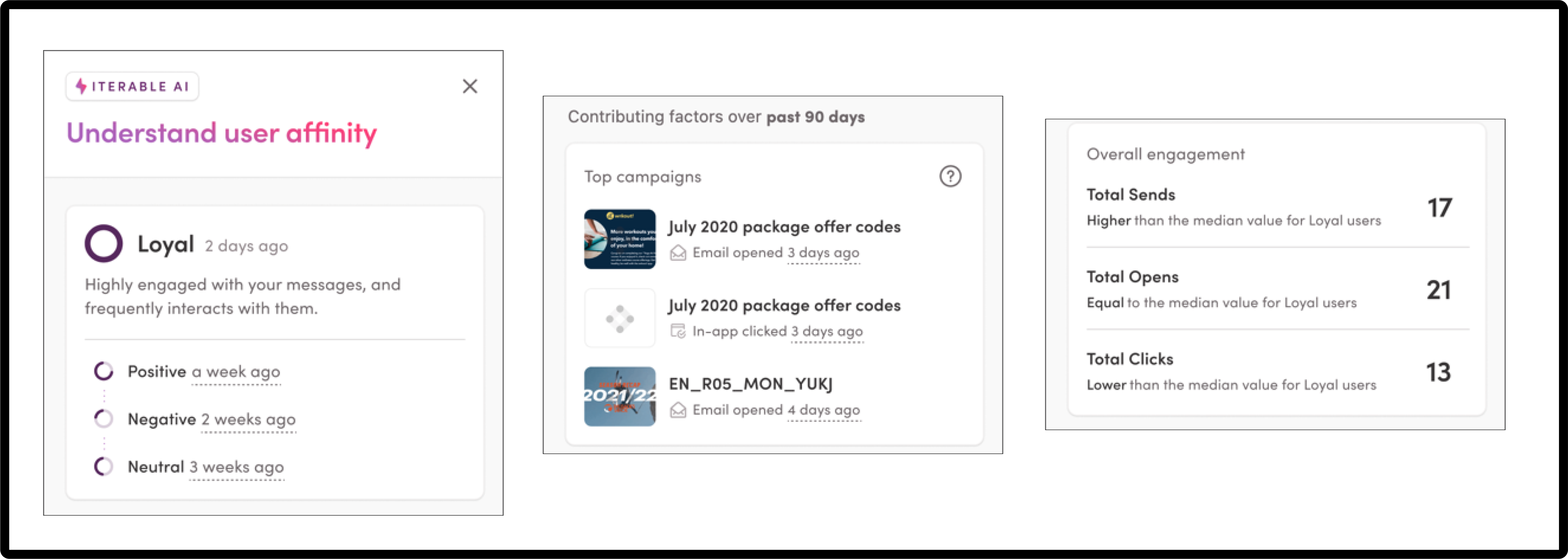
3. Braze AI-Powered Testing
Braze’s AI-powered testing transforms how brands optimize their customer journeys by applying machine learning-driven experimentation at every stage. This advanced approach allows you to test and refine every element of your marketing strategy—from timing and copy to channels, images, and entire customer journeys.
By leveraging AI to conduct these experiments, you can gain deeper insights into what works best for your audience, ensuring that each interaction is tailored for maximum impact. This iterative process helps create more engaging and effective experiences, ultimately driving better results and higher satisfaction across your customer base. With Braze’s AI-powered testing, you can move beyond basic A/B testing to continually evolve and perfect your customer engagement strategies.
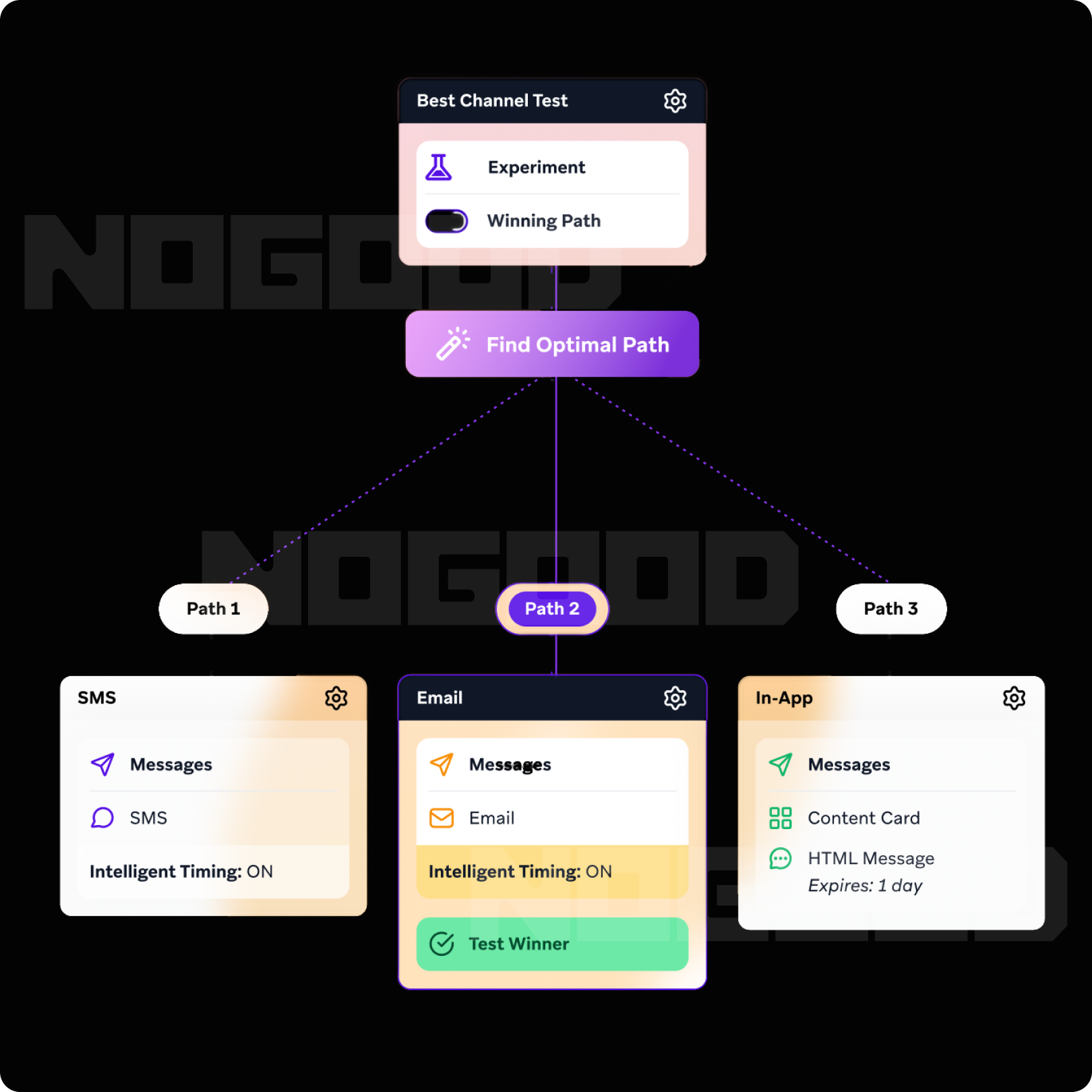
These are just a few examples of how brands and marketers can be using AI to personalize email campaigns and journeys. The key is less so in what tools you use, but more about being aware of the vast variety of tools that are available for use — just so long as you know to take advantage of them to supercharge your email marketing initiatives.
What Role Does AI Play in the Future of Email Marketing?
AI is already becoming a ubiquitous part of marketing functions, from content writing to paid advertising, and email marketing is no exception. Through advanced algorithms and machine learning, AI can analyze vast amounts of data to understand customer behaviors and preferences, allowing marketers to craft highly targeted and relevant content.
AI-powered tools can automate email scheduling, segment audiences with precision, and even predict the best times to send emails for maximum engagement. Furthermore, AI can enhance A/B testing processes, providing insights into what types of subject lines, copy, and visuals resonate best with different segments.
In the future, AI will likely become more and more integrated with email marketing by enabling hyper-personalization at scale. Predictive analytics will evolve to not only recommend the best content but also to dynamically generate it, tailoring each email to individual recipient’s preferences and behaviors in real-time. AI will integrate with advanced sentiment analysis, allowing marketers to gauge the emotional tone of their audience and adjust messaging accordingly.
Moreover, AI will anticipate customer needs before they even articulate them, using sophisticated algorithms to predict lifecycle stages and sending proactive, value-driven content. This anticipatory approach will transform email marketing from a reactive to a proactive strategy, fostering deeper customer relationships and significantly boosting loyalty and retention. If you need help understanding how to leverage current AI technologies for strategic email personalization, drop us a line and let’s work together.






